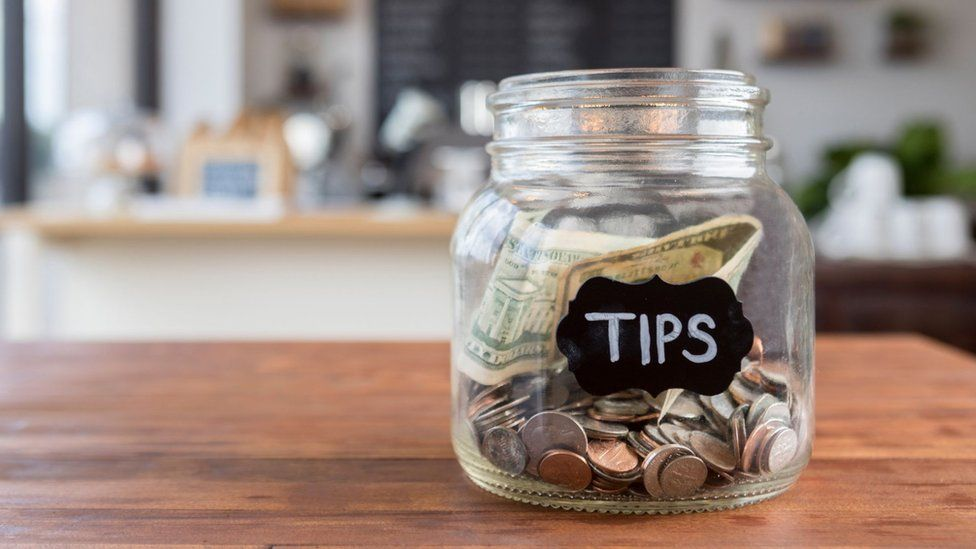Tipping culture in Australia — should we follow the 'American' example?
By
- Replies 5
Is tipping really necessary? It seems like a silly question, but it's one that is becoming more relevant as tipping becomes more common in countries where it wasn't previously customary.
Australia is the latest country to enter the tipping debate, as social media users have taken to Reddit to express their displeasure with the new practice. Tipping is slowly becoming more common in Australia, thanks in part to the influence of the US media.
While some people see tipping as a way to show appreciation for good service, others view it as an unnecessary expense. In a country like Australia, where tipping was never previously customary, many people feel that they shouldn't have to start paying tips simply because the US media has popularised the practice.
One user wrote: "What I really hate is being asked to tip when I'm in a restaurant and instead of a waiter/waitress looking after us I have to scan a QR code stuck to the table to get the menu, to order, and to pay. What exactly am I tipping for here?"
"The worst is when it has the 5% or 10% tip pre-selected so that you have to manually change it to 0. It’s annoying and stupid," another added.
A third chimed in: "Worst bit with those QR code things is there is a transaction fee automatically added on top as well as the tipping prompt."

Tipping was not a common practice in the country until the proliferation of American media in modern society, which influenced servers to ask for tips. Credit: Getty Images.
While some restaurants don't automatically add the tipping fee to your bill, several users shared how the staff members seem to become more insistent on receiving tips from customers.
One person shared: "I got asked at a bar once in Victoria called bar liberty. I mean the service was fine, the food was fine, the price was already high, but the way they asked was particularly guilting too."
"Asking me questions about how I enjoyed stuff, how was my service, did I enjoy myself, then please consider when tipping."
"Handing me the eftpos machine. Oh and if I recall the top item in the menu was the 15% (most likely to quickly press) and the lower ones in the menu, cheaper. It f**king sucked the experience, haven't been back since."
Others pointed out that tipping harms the workers more than it benefits them as businesses would have a reason to undermine the calls for wage increase, with some saying that the burden of low wages are being passed on to customers instead of the businesses.
One comment read: "Do what you will but I agree, it's not great to normalise a tipping culture in Australia. It just gives corporations fuel to try and lower minimum wages and entitlements."
"I was asked at a restaurant 'Will you be supporting your staff today by tipping them?' How about YOU support your staff," one person shared, explaining that the responsibility to provide a raise is being redirected to the customers.
A third chimed in: “If we allow tipping to be normalised in Australia, companies will use that to shaft workers wages. Don't let us become like the USA.”

Several users pointed out that the burden of businesses to financially support their staff members are being passed on to the customers. Credit: iStock.
Speaking of misplaced responsibility, one person shared insider knowledge about how the tips are being distributed.
The user claimed: "My ex used to work in a restaurant. They never asked for tips, but the tips they did get were split between the wait staff and the kitchen staff."
"The general idea is that everyone in the restaurant doing their job well is what gets tips, and if everyone is doing well they should share them."
"It's not just the waiter that served you that took part in providing the customer with a positive experience. That same ex also worked in a different restaurant where the owner got 100% of the tips and most of the wait staff were internationals getting paid $50 a night cash. There's definitely scoundrels out there."
Meanwhile, others shared how they experienced the tipping culture in the USA.
One person shared: “In some places in the US I've gone to order and pay at the counter and have been prompted for a tip before even getting the meal.”
“What am I tipping for, the great meal and service I haven't received yet? Small things, but it all adds up in the long run.”
“I swear my kids will be going to a restaurant, ordering a meal, picking it up themselves, cleaning down the table when they are done, then doing the dishes. Paying for the privilege of this experience and tipping on top.”
Another claimed: “It was frustrating travelling through the US-the prices on the menu were never what you were expected to pay. When we were in New York, a waiter followed us out of the restaurant, complaining that we hadn’t tipped properly.”
“He said that it was completely expected that you would tip 20% in New York. He was telling us (& the other patrons were listening), that he had a family and was reliant on tipping to make ends meet.”
“Given tipping is pretty much mandatory, then the price of the meal should just include the extra cost, otherwise it’s quite deceptive. It is the employer’s responsibility to ensure that their staff are paid properly, not the patrons.”
“Discourage tipping in Australia, we want the prices on menus to reflect what the restaurant/staff will receive, and anything else is just a bonus.”
Others also pointed out that it is rude to directly ask for tips even in America.
One user said: “Even in America, it is very expected that the server always brings you your exact change. This situation you described would definitely be seen as rude here.”
On the other hand, another user pointed out that in America, restaurant staff always expect a tip, regardless of the type of service they have given.
They wrote: “As an American, this is a mind-blowing thread to read. Tipping 20% is standard and anything less is perceived as being cheap/rude. America is so lost.”
What do you think? Is tipping a necessary part of the dining experience? Or is Australia being too heavily influenced by American culture?
For those of you who are curious about the tipping culture around the world, we recommend checking out this video:
Credit: YouTube/Where's My Food? Documentary Film
Australia is the latest country to enter the tipping debate, as social media users have taken to Reddit to express their displeasure with the new practice. Tipping is slowly becoming more common in Australia, thanks in part to the influence of the US media.
While some people see tipping as a way to show appreciation for good service, others view it as an unnecessary expense. In a country like Australia, where tipping was never previously customary, many people feel that they shouldn't have to start paying tips simply because the US media has popularised the practice.
One user wrote: "What I really hate is being asked to tip when I'm in a restaurant and instead of a waiter/waitress looking after us I have to scan a QR code stuck to the table to get the menu, to order, and to pay. What exactly am I tipping for here?"
"The worst is when it has the 5% or 10% tip pre-selected so that you have to manually change it to 0. It’s annoying and stupid," another added.
A third chimed in: "Worst bit with those QR code things is there is a transaction fee automatically added on top as well as the tipping prompt."
Tipping was not a common practice in the country until the proliferation of American media in modern society, which influenced servers to ask for tips. Credit: Getty Images.
While some restaurants don't automatically add the tipping fee to your bill, several users shared how the staff members seem to become more insistent on receiving tips from customers.
One person shared: "I got asked at a bar once in Victoria called bar liberty. I mean the service was fine, the food was fine, the price was already high, but the way they asked was particularly guilting too."
"Asking me questions about how I enjoyed stuff, how was my service, did I enjoy myself, then please consider when tipping."
"Handing me the eftpos machine. Oh and if I recall the top item in the menu was the 15% (most likely to quickly press) and the lower ones in the menu, cheaper. It f**king sucked the experience, haven't been back since."
Others pointed out that tipping harms the workers more than it benefits them as businesses would have a reason to undermine the calls for wage increase, with some saying that the burden of low wages are being passed on to customers instead of the businesses.
One comment read: "Do what you will but I agree, it's not great to normalise a tipping culture in Australia. It just gives corporations fuel to try and lower minimum wages and entitlements."
"I was asked at a restaurant 'Will you be supporting your staff today by tipping them?' How about YOU support your staff," one person shared, explaining that the responsibility to provide a raise is being redirected to the customers.
A third chimed in: “If we allow tipping to be normalised in Australia, companies will use that to shaft workers wages. Don't let us become like the USA.”
Several users pointed out that the burden of businesses to financially support their staff members are being passed on to the customers. Credit: iStock.
Speaking of misplaced responsibility, one person shared insider knowledge about how the tips are being distributed.
The user claimed: "My ex used to work in a restaurant. They never asked for tips, but the tips they did get were split between the wait staff and the kitchen staff."
"The general idea is that everyone in the restaurant doing their job well is what gets tips, and if everyone is doing well they should share them."
"It's not just the waiter that served you that took part in providing the customer with a positive experience. That same ex also worked in a different restaurant where the owner got 100% of the tips and most of the wait staff were internationals getting paid $50 a night cash. There's definitely scoundrels out there."
Meanwhile, others shared how they experienced the tipping culture in the USA.
One person shared: “In some places in the US I've gone to order and pay at the counter and have been prompted for a tip before even getting the meal.”
“What am I tipping for, the great meal and service I haven't received yet? Small things, but it all adds up in the long run.”
“I swear my kids will be going to a restaurant, ordering a meal, picking it up themselves, cleaning down the table when they are done, then doing the dishes. Paying for the privilege of this experience and tipping on top.”
Another claimed: “It was frustrating travelling through the US-the prices on the menu were never what you were expected to pay. When we were in New York, a waiter followed us out of the restaurant, complaining that we hadn’t tipped properly.”
“He said that it was completely expected that you would tip 20% in New York. He was telling us (& the other patrons were listening), that he had a family and was reliant on tipping to make ends meet.”
“Given tipping is pretty much mandatory, then the price of the meal should just include the extra cost, otherwise it’s quite deceptive. It is the employer’s responsibility to ensure that their staff are paid properly, not the patrons.”
“Discourage tipping in Australia, we want the prices on menus to reflect what the restaurant/staff will receive, and anything else is just a bonus.”
Others also pointed out that it is rude to directly ask for tips even in America.
One user said: “Even in America, it is very expected that the server always brings you your exact change. This situation you described would definitely be seen as rude here.”
On the other hand, another user pointed out that in America, restaurant staff always expect a tip, regardless of the type of service they have given.
They wrote: “As an American, this is a mind-blowing thread to read. Tipping 20% is standard and anything less is perceived as being cheap/rude. America is so lost.”
What do you think? Is tipping a necessary part of the dining experience? Or is Australia being too heavily influenced by American culture?
For those of you who are curious about the tipping culture around the world, we recommend checking out this video:
Credit: YouTube/Where's My Food? Documentary Film







